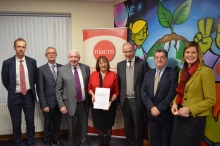Strengthening family ties is key to preventing reoffending and reducing intergenerational crime.

Stressful or traumatic experiences can have a huge impact on children and young people throughout their lives. Parental imprisonment, along with parental separation is an adverse childhood experience, with research demonstrating that almost two thirds of prisoners’ sons are likely to offend themselves.[1] Enabling those in prison to maintain meaningful and ongoing contact can mitigate the harm to families, particularly children and young people, impacted by imprisonment.
In 2016/17, the annual cost per prison place in Northern Ireland was £53,408.[2] It is estimated that men in prison who have visits from their family are 39% less likely to reoffend than those who do not.[3] Maintaining and/or repairing family relationships is central to rehabilitation and effective resettlement.
Moreover, families can make a significant difference to prison safety, particularly in relation to information that could keep their family member and other prisoners safe. It is critical that families and significant others need a clearer and more effective role in the processes that keep prisoners safe.
Addressing the NIACRO AGM this week, Lord Farmer, author of ‘The Importance of Strengthening Prisoners' Family Ties to Prevent Reoffending and Reduce Intergenerational Crime’ (2017) said:
“It is not a case of being tough on crime - if bringing prisoners face-to-face with family responsibilities helps reduce reoffending this means: fewer victims, more children growing up with their parents, fewer prisoners, lower costs, more prisoners taking advantage of educational and employment opportunities so they come out and work, as well as more tax revenue.”
Olwen Lyner, NIACRO CEO said:
“NIACRO understands that support is limited for partners, children and extended family when someone enters custody, despite Lord Farmer’s review and a wealth of evidence which shows effective support at this stage results in better outcomes for the family, the person in prison, and the wider community. Providing appropriate emotional and practical support for families affected by imprisonment greatly reduces the risk of reoffending and contributes to the creation of safer communities.”
NIACRO is calling for a commitment from decision makers to six pledges to contribute to a safer and fairer society with less offending and fewer victims. These include: removing barriers to effective resettlement; an end to the criminalisation of children; support for families and children affected by imprisonment; the pursuit of alternatives to prosecution; attendance of mental health and wellbeing across the criminal justice system; and tackling hate crime.
Notes to editors
- NIACRO is a voluntary organisation that has been working for almost 50 years to reduce crime and its impact on people and communities.
- For more information on the work of NIACRO, visit the NIACRO website: www.niacro.co.uk
- For more information on NIACRO’s Policy Priorities, visit the NIACRO website: https://www.niacro.co.uk/policy-priorities-2017-2018
- For media enquiries, contact Katherine McCloskey, Public Affairs and Policy Co-ordinator (NIACRO) on 028 9032 0157 or via email at katherine.mccloskey@niacro.co.uk
[1] May C., Sharma N. and Stewart D., (2008). Factors linked to reoffending: a one-year follow-up of prisoners who took part in the Resettlement Surveys 2001, 2003 and 2004. London: Ministry of Justice.
[2]Northern Ireland Prison Service Annual Report and Accounts 2016/17, p.13.
[3] May C., Sharma N. and Stewart D., (2008). Factors linked to reoffending: a one-year follow-up of prisoners who took part in the Resettlement Surveys 2001, 2003 and 2004. London: Ministry of Justice.



